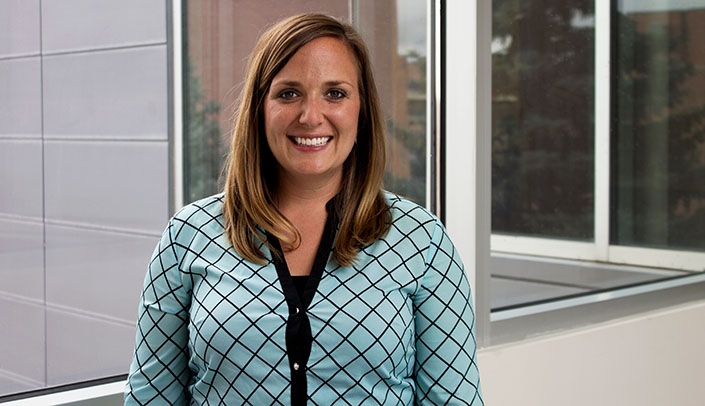Caregiver participation in patient care leads to better, safer experiences for patients and caregivers. Critical care guidelines call for family caregivers to be active partners in bedside care in the intensive care unit (ICU). But there are few evidence-based strategies to engage family caregivers in specific ways.
Personal experience a motivator
Personal experience motivated Dr. Hetland to do research with families in the ICU.
“My dad had a stroke a couple of years ago,” she said. “I watched my parents struggle to navigate the ICU. They had little insight into how to talk with health care providers, what questions to ask, what services were needed, and how to transition from the ICU to home. It was a really humbling experience for me. As a nurse and a researcher, I knew we could provide so much more support for individuals suffering from critical illness.”
A two-year, $50,000 pilot study funded by the American Association of Critical Care Nurses hopes to change that.
Breanna Hetland, Ph.D., principal investigator of the grant, will test the feasibility and acceptability of a new web app to improve the experience of mechanically ventilated patients and their family caregivers in the adult ICU.
The web app will be installed on tablets provided at Nebraska Medicine. It will offer family caregivers an interactive orientation to the ICU, as well as teach them how to assess, record and treat two common patient symptoms, thirst and anxiety.
Ventilators are most often used if a disease or condition impairs lung function, but being on a ventilator is extremely uncomfortable.
“Overuse of sedative and analgesic medications can cause patients to have issues with memory, cognition, emotional stability, and medication withdrawal,” Dr. Hetland said. “We strive to reduce our use of these medications, but that’s really hard when you’re a nurse taking care of a patient who’s uncomfortable or agitated. Unfortunately, we don’t have many other options to offer.”
She said caregivers can learn simple, appropriate techniques to alleviate patients’ symptoms. Their involvement also may help lessen some of the demand on busy ICU nurses.
“Family caregivers are often better than health care providers at accurately assessing patient symptoms, but we haven’t yet studied whether they can be leveraged to lessen the symptom burden and pharmacologic needs of ventilated patients,” Dr. Hetland said.
Researchers will enroll 60 family caregivers. One group will receive routine ICU care and support. The other group will receive a tablet with the web app and be asked to assess, record, and treat symptoms every four hours when visiting the patient.
“The project will help us further define the scope, extent, and nature of patient and family engagement in the ICU,” Dr. Hetland said. “If proven feasible, our intervention holds the potential to shift current ICU nursing practices by integrating family caregivers as dynamic partners in care.”
The research team plans to launch the study in the ICU of the C.L. Werner Cancer Hospital in the Fred & Pamela Buffett Cancer Center and recruit study participants in December.

What an awesome idea. I am sure many family caregivers patients, and nurses will benefit as they become provident in the application. Well done